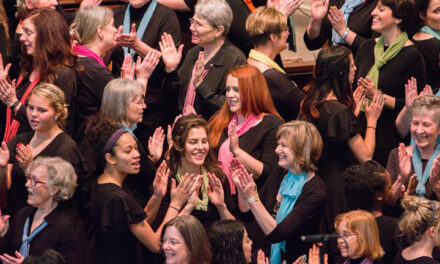A full house gathered at Baldwin Auditorium on Saturday night for “Sounds of Justice & Inclusion: Honoring Rev. Martin Luther King, Jr.” In fact, the crowd was so unexpectedly large that it presented considerable challenges for the ushers and housing staff at Baldwin. The program was around 25 minutes late getting started, but the crowd was patient and seemed in high spirits anticipating the musical extravaganza that lay ahead.
Dr. Benjamin D. Reese of the Duke Office for Institutional Equity gave a brief, very warm welcome referencing the remarkable spirit of cooperation that went into the planning of this event over the past year and a half. The opening number, performed by the Durham Symphony Orchestra under the baton of maestro William Henry Curry, was Scott Joplin’s turn-of-the-century (1899-1900) international sensation, “Maple Leaf Rag.” It was an introduction for many of the incredible creative capabilities of a people who had not yet been accredited the respect and dignity they deserved.
The orchestra continued with a medley of selections by the American musical genius, Duke Ellington. Tunes that have become part of our national consciousness like “Don’t Get Around Much Any More” and “It Don’t Mean A Thing If It Ain’t Got That Swing” were included.
John Brown and his “little” Big Band, a great Triangle treasure, was set up on stage right and opened the jazz door fully with a hopping arrangement of “Down by the Riverside” with solo riffs by tenor sax master, Brian Miller, Cameron MacManus on trombone, and jamming Orlando Perry on drums. The history of jazz is the history of integration before the integration movement. There was and is something about jiving together that makes differences not matter.
Then it got better with soul singer Yolanda Rabun joining the “little” Big Band for a resounding rendition of “Just a Closer Walk With Thee.” She wowed the audience and shared the stage with solo work from members of the band.
The first half of the concert concluded with the DSO’s performance of Curry’s dramatic composition “Eulogy for a Dream,” a tribute to MLK for orchestra and narrator. The narrator was Keith Snipes, well-known actor, speaker, radio and TV host, whose rich baritone voice in this reading caught the heroic as well as the intimate voice of King. His words of wisdom, challenge, and encouragement to the nation he loved were richly enhanced with Curry’s inspired orchestration. It was an experience to be treasured.
After a mingling intermission, the audience was treated to the Shaw University Male Ensemble – a group of nine young men from the Shaw Choir, prepared by Lonieta Cornwall. They sang “Swing Down, Chariot” in an arrangement by Andre Thomas highlighting the male quartet, barbershop singing style. Let me tell you, they were sensational, well trained and well prepared. But when soloists, Preston Poole, a rich tenor, and Tyree Smith, a natural true basso-profondo did their thing, the audience burst into immediate applause. At the conclusion of their selection, the applause was so intense and prolonged, they returned to the stage to reprise the last chorus. Bravo!
The last words of Dr. King were about music he wanted played at the church service in Memphis where he was scheduled to speak that night. He requested “Precious Lord, Take My Hand.” Curry directed the Durham Symphony Orchestra with tenor saxophonist Miller in this touching memory of the great man.
Next on the program, the John Brown “little” Big Band pulled out all the stops for a grand performance of the Duke’s “Pie Eye’s Blues.” Just about every member of the band got to strut their stuff in a stand-up solo, from the low-down baritone sax to the squealing high notes of the trumpet, the ivories got tickled good and, Brown rode the stand-up bass hard. It was super.
Rabun joined the band again for the Joe Zawinul soul classic, “Mercy, Mercy, Mercy” as arranged by Jon Harpin.
Snipes returned to the stage to read a tender and moving tribute to the late beloved John Hope Franklin, the eminent historian who opened the eyes of many to the depth of the oppression and disregard of his people and the work that yet lies ahead to end the evils of racism, militarism and materialism that lurk in our society.
100 Men in Black is a community chorus open to men of all ethnicities and walks of life drawn together by the common love of singing. Under the direction of Marlon E. West, they sang a rousing and inspiring arrangement of “Lift Every Voice and Sing.” Many in the audience stood in respect and appreciation for those who marched, sat, stood firm, and endured so much with Dr. King that our society might move in the direction of justice and equality.
The “little” Big Band joined the Durham Symphony Orchestra in the last piece written by Ellington. It is called “Martin Luther King” and is a mellow, almost prayerful memorial to him.
Meeting the challenge of concluding an evening such as this required the combined forces of the orchestra, the band, the chorus and the soloist who all together performed Peter Wilhousky’s venerable Hollywood arrangement of the “Battle Hymn of the Republic.”
By now, it was almost 11 p.m. Only a handful had left their seats earlier. It was a grand evening, a fitting celebration of the life and ministry of Dr. King and the inestimable contributions of Dr. Franklin. All of those who participated offered memorable gems and the applause was particularly enthusiastic when Curry announced plans in the works to make this an annual event.











